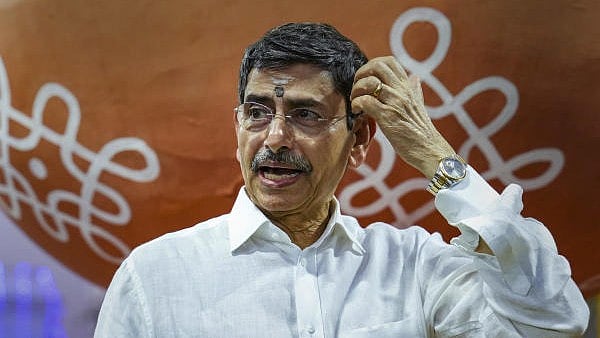
Tamil Nadu Governor R N Ravi.
Credit: PTI Photo
New Delhi: The Supreme Court on Monday questioned Tamil Nadu Governor R N Ravi's silence on the bills, which culminated in withholding of his consent.
The court sought any one communication sent by him to the state government regarding his objections in connection with the constitution of the search-cum-selection committee for the appointment of vice-chancellors (VCs) in state universities.
A bench of Justices J B Pardiwala and R Mahadevan opined, had the Governor communicated the reasons for withholding assent, the state would have probably accepted it.
“Take us to one communication by the governor to the state government saying it has not kept in mind the University Grants Commission (UGC) regulation, and what was the response of the state government,” the bench asked Attorney General R Venkataramani, appearing for the Governor.
Senior advocate P Wilson, for the Tamil Nadu government, said the formation of the selection committee was the issue, and under the Act the chancellor had only the option of nominating.
“We are not able to understand, if the Act provides that it is the chancellor who will be the authority, then why this issue of UGC cropped up? Should it not be taken that these communications were in respect of the bills," the bench asked.
The AG contended that all this communication, even though not expressly made, was in the context of the bills. He said the Governor kept saying please go ahead with the search and selection committee under his authority, but the government disagreed.
The bench asked the AG if the Governor had “something in his mind” when he withheld consent to the bills sent to him for assent by the state government. It further said, yet, the Governor did not communicate what was troubling him about the proposed laws.
The bench said that the Governor was quiet for one or two years, and he withheld the consent and then, suddenly he says I have referred them to the President.
The AG insisted that the Governor had communicated his objections to the state regarding the constitution of the search-cum-selection committee for the appointment of VCs in state universities.
The court said the state might have agreed with the Governor, and if the he had told the state government about his reservations, if he had found them repugnant?
The bench observed that it would not have been an empty formality, when the legislative assembly reconsidered the 10 bills in its special sitting on November 18, 2023.
Senior advocate A M Singhvi, representing the Tamil Nadu government, contended that good governance required the governor to communicate reasons for withholding consent.
During the hearing, the bench also asked why the state took only five days for re-passing the 10 bills, and pointed out that the Governor had withheld consent on November 13, 2023. The state government submitted that the state legislature was the “boss” in the constitutional sense under Article 200. The counsel insisted that the Governor had no discretion under the provision.
Upon hearing arguments for the entire day, the court reserved the judgment on Tamil Nadu government pleas over delay in governor’s assent of bills, including the constitution of search-and-selection committees for the appointment of VCs in universities.
